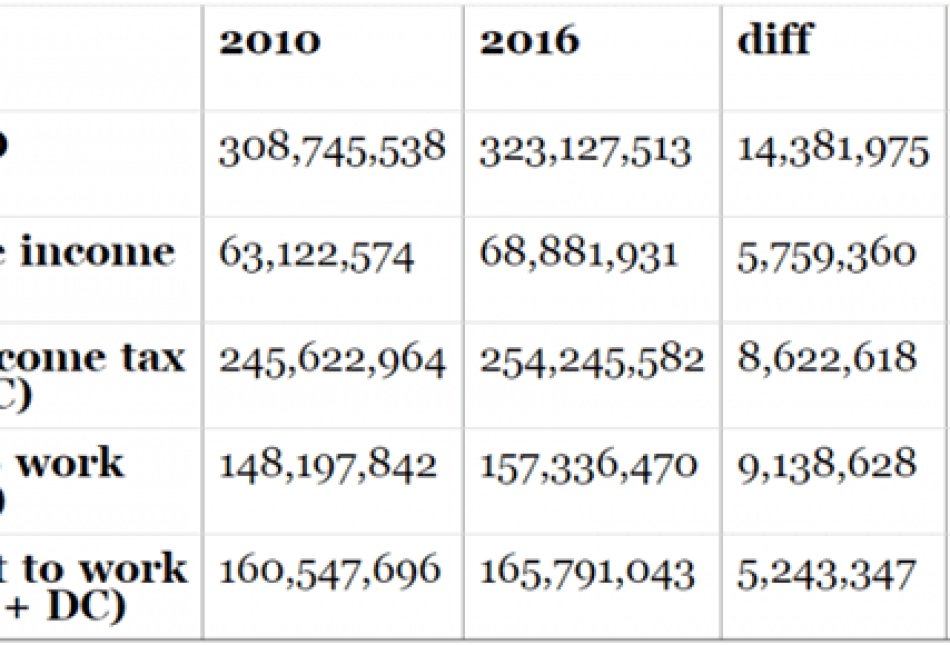Come up with a better alternative, Mr. Terrazas

The Rio Grande Foundation has clear and specific views on economic policy. We support concepts like “right to work,” school choice, and others that reduce government’s role in the economy and in picking winners and losers. There are valid critiques of any and all policy recommendations, but in a recent debate at NMPolitics.net RGF president Paul Gessing provided a detailed response to one naysayer.
![]()
Like so many New Mexicans, Art Terrazas grew up and was educated in New Mexico, but left the state for better opportunities elsewhere. From his perch in the D.C. area, home to 5 of the nation’s 6 wealthiest counties, Terrazas recently criticized several ideas put forth by the Rio Grande Foundation.
His critiques don’t hold up under scrutiny and his only actual policy recommendation, pre-K expansion, is already under way in New Mexico (the permanent fund hasn’t been tapped as some would like, but spending has grown dramatically under Gov. Martinez). Pre-k investment has also been tried with mixed results by the federal government (Head Start), and implemented in several states with mixed results.
What does Mr. Terrazas have to say about our particular ideas? Let’s start with “right to work.” For starters, “right to work” is hardly anti-union. Rather, workers should be able to choose to be part of a union and pay dues or be able to opt out.
Americans are flocking to “right to work” states. Between 2010 and 2016, states with “right to work” laws saw population growth of 6.2 percent, while states without them grew by 3.3 percent.
Terrazas asserts that California is among the “healthiest economies” nationwide. It is true that California has a strong technology sector and a private sector that New Mexico sorely lacks, but there has also been an ongoing exodus from California in recent years. It is hardly a model for other states to emulate, let alone New Mexico.
Prevailing wage (Davis-Bacon) repeal is another issue Terrazas takes issue with. I believe that construction workers on schools and roads should be paid based on market conditions. Terrazas believes that unions should collaborate with government to set wages. I think we’d be better off with more and better roads and schools built at a reasonable cost. Terrazas believes that one group of workers should be shielded from economic conditions at the expense of the rest of us (taxpayers) and our children.
This pattern of choosing special interests over taxpayers and market forces is what has made New Mexico poor in the first place.
When it comes to school choice, Mr. Terrazas really illustrates his ignorance of market processes. He highlights the limited number of private schools in Las Cruces as an obstacle to choice, but fails to realize that if parents and students are empowered to choose the school they prefer options will arise to fill that demand. And, since schools of choice must compete to serve their customers, those schools will face pressure to improve quality and student outcomes.
Terrazas talks a big game about “needing to try new ideas,” but the reality is that the Rio Grande Foundation is looking at what works elsewhere and is attempting to apply it to New Mexico.
Fast-growing Texas, Arizona and Utah are surrounding states that have “right to work” laws in place. Texas has no income tax while Colorado’s Constitution strictly limits spending growth. Surplus dollars are returned to the taxpayers and all tax hikes are voted on.
In the area of education, Arizona has long been a leader in school choice, getting better results at a much lower cost than New Mexico. Even more exciting is Arizona’s recent adoption of a cutting-edge school choice concept called “Education Savings Accounts.”
This new program will allow parents to withdraw their children from public district or charter schools and receive a deposit of public funds into government-authorized savings accounts. That money can then be used to pay for private school tuition and fees, online learning programs, private tutoring, community college costs, higher education expenses and other approved learning services and materials.
I think it will be a huge success that further separates Arizona from New Mexico in terms of educational outcomes. Unfortunately, New Mexico’s sole form of school choice (charter schools) is under attack in the Legislature. A moratorium bill barely failed on the House floor, with a few Democrats joining Republicans to stop it.
I suspect that if Terrazas actually put forth his own reform plan, it would be nothing more than a grab-bag of tired, left-wing ideas that have been tried and failed. I’d love to be proven wrong and I’d love to debate those ideas with him.
It is time for dramatic change in New Mexico. The Rio Grande Foundation may not have all the answers, but I’d sure like to see New Mexico try a few of them before it’s too late.
Paul Gessing is the president of New Mexico’s Rio Grande Foundation, an independent, non-partisan, tax-exempt research and educational organization dedicated to promoting prosperity for New Mexico based on principles of limited government, economic freedom and individual responsibility.
